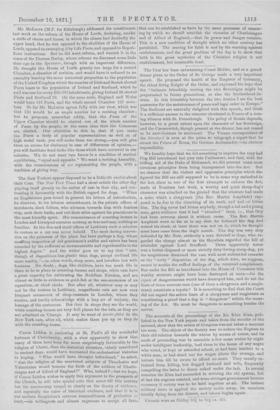Canon Liddon is reviewing at St. Paul's all the wonderful
fortunes of Christianity, with a view apparently to show that many of theta have been far snore surprisingly favourable to the religion of Christ, than the historical situation, calmly considered in ancient days, would have warranted the ecclesiastical historian in hoping. " Who would have thought beforehand," he asked, " that the religion of the enervated subjects of Theodosius and Valentinian would become the faith of the soldiers of Charle- magne and of Alfred of England?" Who, indeed ?—but we hope, if Canon Licldon wishes to apply this argument to the prospects of the Church, be will take special note that never till this century has the controversy turned so clearly on the theory of evidence, and especially the value of historical evidence, and that it is in our modern Scepticism's extreme reasonableness of profession at least,—its willingness and almost eagerness to accept all facts that can be established as facts by the same processes of reason- ing by which we should establish the victories of Charlemagne and of Alfred of England,—that its power and danger consists. This is a new condition of thought which no other century has paralleled. The craving for faith is met by the warning against credulousness, and the great problem of the day is to show that faith in the great mysteries of the Christian religion is not credulousness, but reasonable trust.










































 Previous page
Previous page